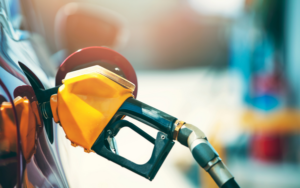In July 2022, the average cost to fill up a family car reached a record high, tipping over £100, with the price of petrol and diesel costing more than 190p per litre. Although fuel prices have dropped since this peak, they remain high. In this helpful money-saving guide, we provide some practical tips on how you can reduce your fuel costs and consumption.
For additional money-saving tips, read our article 'How to save money on your household bills' and find out if you are eligible for Cost of Living support in our Cost of Living Guide.
How to save money on fuel
1. Shop around
One of the easiest ways to save money on fuel is by shopping around for the best deals. Follow these tips to try and get the best prices on your petrol and diesel:
Don't use premium fuel
Unless you have a high-performance vehicle it is unlikely that you will need to use premium fuel in your vehicle. Reverting to normal unleaded and diesel will instantly save you money as premium fuels are more expensive when filling up. However, if you have a particularly old vehicle you may need to check the best fuel for your car since the ethanol amount has changed in regular fuel and may no longer be suitable for your vehicle.
Use petrolprices.com
PetrolPrices.com is the easiest way to find the best price of fuel in your local area. It allows you to find the cheapest petrol and diesel rates based on your location which is particularly handy as we found that prices could vary as much as 8%, so that could mean an £8 saving on a tank of petrol! It is however worth considering how far you need to drive in order to save money on your fuel. We have put together a handy table that helps to explain Damien's 2-for-1 rule, "Don't drive more than 2 miles per 1p per litre saved".
How far should you drive to save money on fuel?
| Petrol/Diesel price saving (per litre) | Saving on full tank of fuel | Max miles worth driving to save money (petrol car) | Max miles worth driving to save money (diesel car) |
| 1p | £0.50 | 2.4 | 2.6 |
| 2p | £1.00 | 4.7 | 5.2 |
| 3p | £1.50 | 7.1 | 7.8 |
| 4p | £2.00 | 9.4 | 10.5 |
| 5p | £2.50 | 11.8 | 13.1 |
| 10p | £5.00 | 23.6 | 26.1 |
2. Get rewarded as you spend
You can get rewarded for spending on fuel with cashback and rewards cards or by signing up for supermarket point schemes. Find out how below:
Save as you spend with cashback credit cards
Purchasing fuel with a cashback or reward credit card means you can get rewarded for purchases that you are planning to make anyway. For example, Tesco credit cards allow you to earn 1 Clubcard point for every £4 spent on Tesco fuel plus 1 Clubcard point for every litre of Tesco fuel you buy and the American Express Nectar credit card allows you to collect a minimum of 3 points per £1 spent at Esso. To see our pick of the best cashback and reward credit cards currently available in the UK read our regularly updated round ups 'Which are the best cashback credit cards UK?' and 'Compare the best rewards credit cards in the UK'.
Earn money with cashback current accounts
You don't have to open a credit card to benefit from rewards on your spending as you can also get rewarded with cashback current accounts such as Chase Bank which offers 1% on everyday spending for 12 months and Santander Edge which offers 1% cashback on fuel spending. Find out more in our article, 'The best bank account switching offers, cashback and rewards'.
Sign up for loyalty schemes
If you regularly visit a petrol station see if there are any loyalty schemes that you can benefit from such as Tesco Clubcard when buying fuel from Tesco, Nectar when buying fuel from Sainsbury's and Esso or the BP reward scheme.
3. Keep on top of car maintenance
Keeping on top of car maintenance can help to ensure your car is more fuel efficient. Check the following on your vehicle to try and save money on fuel consumption:
Choose economical tyres
Tyres can be responsible for up to 20% of your car's fuel consumption so choose carefully when it comes to replacing your tyres. Replacing tyres can be expensive but choosing a premium tyre could save you money in the long run as they are likely to last longer and be more fuel efficient. Tyres often come with an efficiency rating and the more efficient your tyre the lower your fuel consumption is expected to be, compared to a lower efficiency rated tyre.
Check tyre pressure
Low tyre pressure can contribute to increased fuel consumption due to more rolling resistance which is the energy required by your tyres to maintain a constant speed over a surface e.g the higher the rolling resistance the higher the energy consumption. Your vehicle's desired tyre pressure can often be found in your vehicle's handbook.
Get your car serviced
Regularly getting your car serviced means that oil and fluid levels in your vehicle are checked to ensure the car is running as efficiently as it can and can reduce major problems with your vehicle over time.
Remove roof racks and bars
Having roof racks, bars and storage can affect the aerodynamics of your car and increase drag which makes your engine work harder and so your car, therefore, becomes less fuel efficient.
Remove excess weight from the car
Weighing down your vehicle with unnecessary items in your boot can also decrease fuel efficiency as your vehicle is heavier, making your vehicle use more energy when you accelerate.
Reduce a/c and heater usage
Having your air conditioning and heating on all the time uses engine power which will increase your fuel consumption. Try to open the windows in the summer when driving at low speeds (having windows open at high speeds increases drag and fuel consumption) and try to minimise heater usage in the winter by wrapping up warm for the weather. It is important to note that using the air conditioning or heating at times is required to stop the unit from seizing up which can cause expensive problems later down the line.
4. Adapt your driving
An easy way to manage your fuel consumption is by adapting your driving and becoming more conscious of how minor changes to your routine can affect how much fuel you use and therefore save you money:
Reduce your speed
Driving at high speeds can use more fuel than when driving at lower speeds and despite fuel efficiency speeds varying between vehicle types the RAC suggests that cars are most efficient at 45-50mph. Obviously, the speed you are driving is also affected by speed limits set on the roads so the best way to improve fuel efficiency is to drive more smoothly as a whole and accelerate and brake gently.
Drive in higher gears
Driving in a higher gear and reducing engine revs can save fuel, particularly in towns and cities. If you have a newer vehicle it may suggest going up the gears earlier than you would anticipate or you may be able to turn on an 'eco' mode which manages this for you.
Use cruise control on flat roads
Cruise control is best used on long journeys with flat roads for the utmost efficiency as it helps to maintain a constant speed which is great for fuel efficiency.
5. Drive less
Finally, one of the more obvious ways to save money on your fuel expenses is to drive less and reduce your fuel consumption by opting for alternative modes of travel:
Take public transport
Choosing to use public transport instead of driving can help to save money on fuel. If you are worried about the added cost of using public transport look out for any discounted rates or railcards that you may be eligible for to save on your travel costs. You could be eligible for discounts on bus or train travel for example if you are a student in full-time education, over 60 or have a disability. Alternatively, you may be able to save money by purchasing season tickets or tickets in advance.
Make fewer car journeys
Reducing when you need to use your car will help to save fuel, can you walk to the shops instead of driving or are you able to take public transport to work one day a week? Alternatively in a town or city, you may be able to share journeys with others with apps such as liftshare or arrange to share journeys with friends or colleagues.
Cycle-to-work scheme
If you don't live too far away from your place of work is it possible to benefit from a cycle-to-work scheme via your employer which could see you get a discounted rate on a bike and accessories?
Are electric vehicles cheaper to run?
With the cost of running a petrol or diesel vehicle getting more expensive, you may be wondering if it is worth making the switch to an electric vehicle to save cash. Rising energy costs mean that the cost of charging an electric vehicle is rising and with the added initial cost of purchasing an electric vehicle to consider, it is worth taking the time to consider if the savings are worth it.
Damien and Andy delve into the cost differences between recharging an electric car versus refilling a petrol car in Episode 394 of the Money to the Masses podcast. Click on the player below to listen, or alternatively search for the episode on your favourite podcast app.




